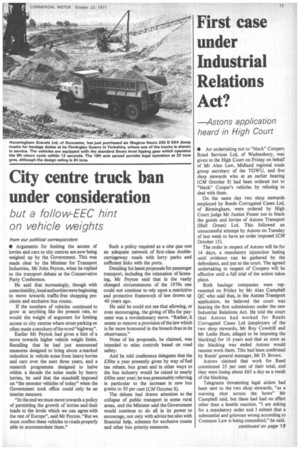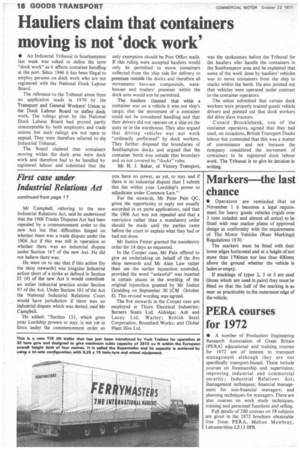First case under Industrial Relations Act?
Page 19

Page 20

If you've noticed an error in this article please click here to report it so we can fix it.
—Astons application heard in High Court
• An undertaking not to "black" Coopers Road Services Ltd, of Wednesbury, was given in the High Court on Friday on behalf of Mr Alan Law, Midland regional trade group secretary of the TGWU, and five shop stewards who at an earlier hearing (CM October 8) had been ordered not to "black" Cooper's vehicles by refusing to deal with them.
On the same day two shop stewards employed by Reeds Corrugated Cases Ltd. of Birmingham, were ordered by High Court judge Mr Justice Foster not to black the goods and lorries of Astons Transport (Hall Green) Ltd. This followed an unsuccessful attempt by Astons on Tuesday of last week to have an order imposed (CM October 15).
The order in respect of Astons will be for 14 days, a mandatory injunction lasting until evidence can be gathered by the defendants, and put to the court. The agreed undertaking in respect of Coopers will be effective until a full trial of the action takes place.
Both haulage companies were represented on Friday by Mr Alan Campbell QC who said that, in the Astons Transport application, he believed the court was hearing the first submissions under the new Industrial Relations Act. He told the court that Astons had worked for Reeds Corrugated Cases Ltd (employers of the two shop stewards, Mr Roy Cowdrill and Mr Leslie Hunt, alleged to be imposing the blacking) for 16 years and that as soon as the blacking was ended Astons would resume work there. This had been confirmed by Reeds' general manager, Mr D. Brown.
Astons claimed that work for Reed constituted 25 per cent of their total, and they were losing about £65 a day as a result of the blacking.
Telegrams threatening legal action had been sent to the two shop stewards, "as a warning shot across the bows" Mr Campbell said, but these had had no effect other than a hostile reaction. "I am asking for a mandatory order and I submit that a substantial and grievous wrong according to Common Law is being committed," he said. Mr Campbell, referring to the new Industrial Relations Act, said he understood that the 1906 Trades Disputes Act had been repealed by a commencement order to the new Act but that difficulties hinged on whether there was a trade dispute under the 1906 Act if this was still in operation or whether there was an industrial dispute under Section 167 of the new Act. He did not believe there was.
He went on to say that if this action (by the shop stewards) was irregular industrial action short of a strike as defined in Section 33 (4) of the new Act it would constitute an unfair industrial practice under Section 97 of the Act. Under Section 101 of the Act the National Industrial Relations Court would have jurisdiction if there was an industrial dispute which was denied, said Mr Campbell.
He added: "Section 131, which gives your Lordship powers to stay, is not yet in force under the commencement order so you have no power, as yet, to stay and if there is no industrial dispute then I submit this lies within your Lordship's power to adjudicate under Common Law."
For the stewards, Mr Peter Pain QC, given the opportunity to reply not usually accorded in ex parte applications, said that the 1906 Act was not repealed and that a restrictive rather than a mandatory order should be made until the parties came before the court to explain what they had or had not done.
Mr Justice Foster granted the mandatory order for 14 days as requested.
In the Cooper case, Mr Pain offered to give an undertaking on behalf of the five shop stewards and Mr Alan Law rather than see the earlier injunction extended, provided the word "unlawful" was inserted in certain places in the wording of the original injunction granted by Mr Justice Goulding on September 30 (CM October 8). This revised wording was agreed.
The five stewards in the Cooper case are employed at Thorn Electrical Industries; Berners Steels Ltd, Aldridge; Ash and Lacey Ltd, Warley; British Steel Corporation, Bromford Works; and Global Plant Hire Ltd.








































































































